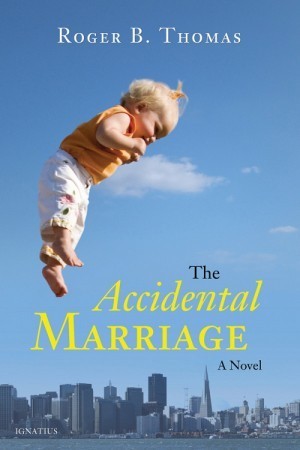An Interview with Roger B. Thomas, author of "The Accidental Marriage"
An Interview with Roger B. Thomas, author of The Accidental Marriage | IPNovels.com
Roger Thomas is a lifelong Michigan resident, has been married to his wife Ellen since 1981. They have six grown children and eight grandchildren. He is a self-employed computer consultant. He loves reading, and his favorite authors include C.S. Lewis, J.R.R. Tolkien, Rudyard Kipling, and P.G. Wodehouse. He has had two collections of short stories published by Ignatius Press, including The Last Ugly Person which was recently featured in a list of 5 More Short Stories That Every Catholic Should Read. Ignatius Press Novels interviewed Roger via email regarding his new novel The Accidental Marriage .
.
Where did the idea for this book come from?
Thomas: Oddly, it was a chance line in an online article. It was written by a woman who considers herself a lesbian, and discussed the costs and challenges of getting pregnant. She made an offhand comment that one last resort option is always to just call up a guy friend for an informal “contribution” to facilitate the pregnancy. I pondered that comment, and that it reflected a very shallow understanding of the intricacy and intimacy of what happens when two people join to bring a child into being. I began imagining what kind of complexities might follow such an interaction, and before long the characters of Scott and Megan were coming to life.
Recently, Archbishop Cordileone of San Francisco made this appeal to people critical of the Church’s position on same-sex marriage: “Please do not make judgments based on stereotypes, media images and comments taken out of context. Rather, get to know us first as fellow human beings… It is the personal encounter that changes the vision of the other and softens the heart.” During the course of the book, Scott and Megan find that their stereotypes and expectations about others are challenged, both in positive and negative ways. Do you hope your book can help draw out that “encounter” between people with divergent opinions?
Thomas: I certainly hope so. Archbishop Cordileone’s statements cut two ways, as he and other church leaders have made clear. We, especially as Catholics, must not judge on stereotypes and media images, but get to know one another personally.
A drawback of our current cultural dialog, fraught as it is with friction and antagonism, is that was start defining ourselves by our differences. I’m male, she’s female; I’m white, he’s black; I’m a veteran, she’s never served, and so on. This has an isolating effect which you can see expressed in statements like, “You couldn’t possibly understand, because you’re not X”, whatever X might be. Pressed to the extreme, this increasingly isolates us from one another, because nobody is ever going to completely share another’s personal conditions and life experience.
As St. John Paul the Great frequently reminded us, one of the roles of the arts is to reach across those walls and reconnect us with each other in our common humanity. When we read a story or hear a song or see a film and find ourselves saying, “Yes! That’s exactly how it is!”, then we’re connecting with one another. And even as Scott and Megan find their categories getting broadened by their life experiences, I hope the readers of The Accidental Marriage come to see the main protagonists for what they are: simply humans, fellow humans searching for love. Easy as it would be to pigeonhole them as a couple of Bay Area gays living out their mistaken world views, I hope the story brings out their essential humanity in a way that resonates with every reader.
It often seems that the business world of tech startups—the way that there is constant agitation for change and growth without much regard for how that change and growth affects the real people involved—is reflective of a view of relationships that values novelty and change over permanence and depth. Was the setting of the book intentional in this regard?
Thomas: Actually, that was unintentional, but it’s interesting to look back on the story and see that correspondence. There is a disturbing similarity between the interchangeable-persons outlook of the modern corporate world and the similar view of “relationships” – of any type – that is common in our culture. Both reflect a short-term, immediate-return outlook. If this employee (or investment, or partner) isn’t “performing”, then it’s time to change it out.
Love is normally portrayed in romantic fiction as a form of self-fulfillment. Do you think our culture’s emphasis on “romance” helps or hinders love?
Carl E. Olson's Blog
- Carl E. Olson's profile
- 20 followers




